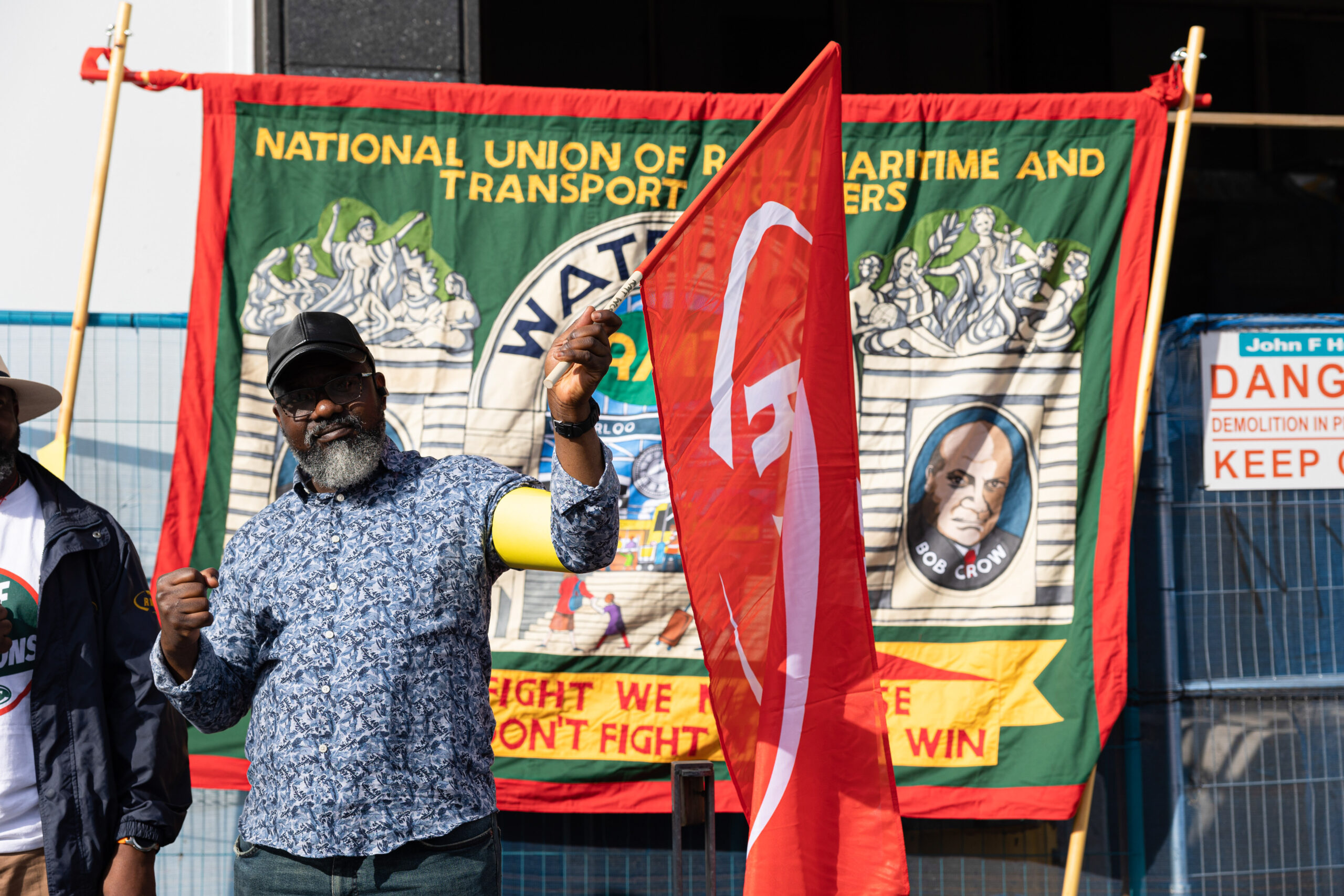By Fighting for Themselves, Trade Unionists Are Standing up for Everyone
The current strike wave has roots that go deeper than 2022.
by Polly Smythe
29 December 2022

This summer, speaking to workers on picket lines, rallies, or at their place of work, I found myself encountering the same words: “I can’t afford to work.” One worker spoke about the loans they’d taken out to pay for the petrol they needed to reach their job, while another listed off the endless shifts they’d had to forgo for the lack of affordable childcare. Although the jobs the workers held varied – tug-boat operatives, food delivery couriers, museum staff, carers, cleaners – they all shared the feeling that it was work, and not its absence, that was making them poorer.
A violent decline in our working conditions and living standards took hold long before 2022. Yet something about the current combination of tensions – high inflation, a build-up of pandemic fury, supply chain interruptions, and a tight labour market – has resulted in the revival of militant organised labour.
This year, a strike wave spanning all sectors has grown: construction engineers striking at Fawley oil refinery in Hampshire, nurses coming out for the Royal College of Nursing’s first national action, bus drivers taking on Abellio, Stagecoach, and Arriva, and Amazon workers voting for the first legal strike following widespread informal stoppages earlier in the summer. Along with these strikes and settlements, a raft of public sector disputes are in the pipeline for early next year, with balloting currently taking place at the National Education Union, British Medical Association and Fire Brigades Union.
The extent of next year’s public sector action will be determined by whether unions prove able to defeat the severely constraining balloting threshold. It has already proved difficult, with Unison passing the threshold at only eight of 262 NHS trusts, and the Royal College of Midwives ballot narrowly falling short in England.
If junior doctors and teachers do join nurses and paramedics, they too will face an intransigent government refusing to negotiate. Unofficially, the government line seems to be that settling one dispute risks opening the door to settling them all, despite the fact that criminal barristers voted to accept a renewed pay offer from the government in October. By refusing to engage in bargaining, ministers appear instead committed to waiting the strikes out. In some cases, they are actively intervening to scupper any chance of a deal.
Whereas Thatcher would have been in direct confrontation with the unions, Sunak is in a curious struggle between wanting to appear tough on unions – evidenced by legislating away the right to strike – while also attempting to distance himself from the strikes, by hiding behind the “independent” pay review process, employers, and “wage-price spirals.”
So far, operating without a plan or understanding of industrial relations has made for an unconvincing government performance. Despite the government’s desire to frame the nurses’ dispute as centred on an unaffordable and unreasonable pay demand – the RCN want a pay rise of 5 per cent above RPI, currently running at 14 per cent – nurses have instead successfully articulated the strike as being over the critical state of the NHS. Discussion about the long-term toll of austerity on healthcare, and not just pay, poses an obstacle to Sunak’s hands-off response.
In his essay Ideas and the Labour Movement, Raymond Williams wrote that by representing their members in immediate and localised ways, unions pose a question to what the general interest could be. By connecting the struggle for pay to a broader unravelling of the state’s capacity – the Department of Education has raised the risk level of school buildings collapsing to “very likely” – as well to rampant corporate profiteering, unions have positioned themselves as representing not only the interests of their members, but for all working people.
The success of this new definition of general interest is caveated: not all unions are joining the fray, and the strategic options open to workers across different sectors remain deeply uneven, with far too many workers either not in unions, or in unions happy to compromise with employers. What’s more, those engaged in labour struggles need to win not just discursively, but practically – it’s no good winning the argument but losing the dispute. And, for workers who have won, it’s tricky to assess the scale of their victories, with pay deals often containing one-off payments that act as bonuses, rather than permanent salary uplifts.
The present strike wave has seen plenty of smaller disputes settled at the local level, while national disputes drag on without negotiated settlements. That’s in part due to there being far more than just pay at stake in both the RMT’s dispute with train operating companies and Network Rail, and in the CWU’s dispute with Royal Mail. In both instances, employers are trying to impose unfavourable workforce reforms. And, despite the framing of hot strike summer and winter of discontent as 2022 phenomena, the roots of several of the national disputes go back years: the ongoing UCU pension dispute will turn five next year, and in 2020 Royal Mail only narrowly avoided a CWU strike.
The glimpses of confrontation we saw in the pandemic – mass job resignations, or teachers challenging the government’s reopening of schools amid Covid – were not momentary, but part of an incipient moment. That this resistance has become sustained, and often successful, gives collective action and solidarity a credibility in people’s lives.
Polly Smythe is Novara Media’s labour movement correspondent.


